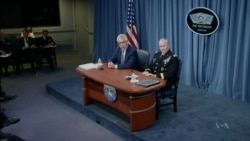U.S. Defense Secretary Chuck Hagel is warning that the Islamic State is more than a typical terrorist group and is an imminent threat to the United States. Speaking to reporters at the Pentagon, Secretary Hagel said U.S. airstrikes have helped stall the momentum of Islamic State militants in Iraq, and have enabled Iraqi and Kurdish forces to regain their footing.
However, he expects the insurgents to regroup and stage a new offensive.
“They are beyond just a terrorist group. They marry ideology and a sophistication of strategic and tactical military prowess. They are tremendously well-funded. Oh this is beyond anything that we have seen,” said Hagel.
Hagel described Islamic State fighters as barbaric, saying they present a serious threat to the United States and other countries.
“They have no standard of decency, of responsible human behavior, and I think the record is pretty clear on that. So yes, they are an imminent threat to every interest we have, whether it is in Iraq or anywhere else,” continued Hagel.
General Martin Dempsey, chairman of the Joint Chiefs of Staff, said the Islamic State could pose a threat to Western countries through the return home of U.S. or European nationals who have fought for the militant group in Syria or Iraq.
“[ISIL] will only truly be defeated when it is rejected by the 20 million disenfranchised Sunnis that happen to reside between Damascus and Baghdad,” said Dempsey.
Their comments came days after Islamic State militants released a video showing the beheading of American journalist James Foley. Foley was a reporter for GlobalPost when he was captured in Syria in 2012.
His news outlet says the kidnappers demanded $132 million in exchange for his release.
State Department spokeswoman Marie Harf says it has long been American policy not to pay ransom in instances where U.S. citizens are being held captive in combat zones.
“The United States government believes very strongly that paying ransom to terrorists gives them a tool in the form of financing that helps them propagate what they are doing. So we believe very strongly that we don’t do that,” said Harf.
U.S. commandos did attempt to rescue Foley and other Americans in Syria. However, the mission failed because the hostages were not at the location where they were believed to have been held.
Limited campaign
So far, President Barack Obama has sought to limit his renewed military campaign in Iraq to protecting American diplomats and civilians under direct threat. Obama ended the war in Iraq that killed thousands of American soldiers and consumed U.S. foreign policy for nearly a decade.
Even after the gruesome killing of Foley, Obama is seen as unlikely to deepen his near-term military involvement in either Iraq or Syria as he seeks to avoid becoming embroiled in another messy Middle Eastern conflict.
But U.S. officials say they have not ruled out escalating military action against Islamic State, which has increased its overt threats against the United States since the air campaign in Iraq began.
“We haven't made a decision to take additional actions at this time, but we truly don't rule out additional action against ISIL if it becomes warranted,” Ben Rhodes, a senior Obama aide, told National Public Radio earlier on Thursday.
Material from Reuters was used in this report.





